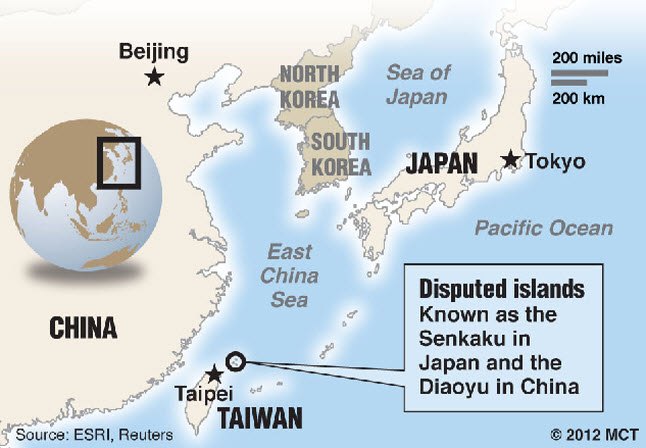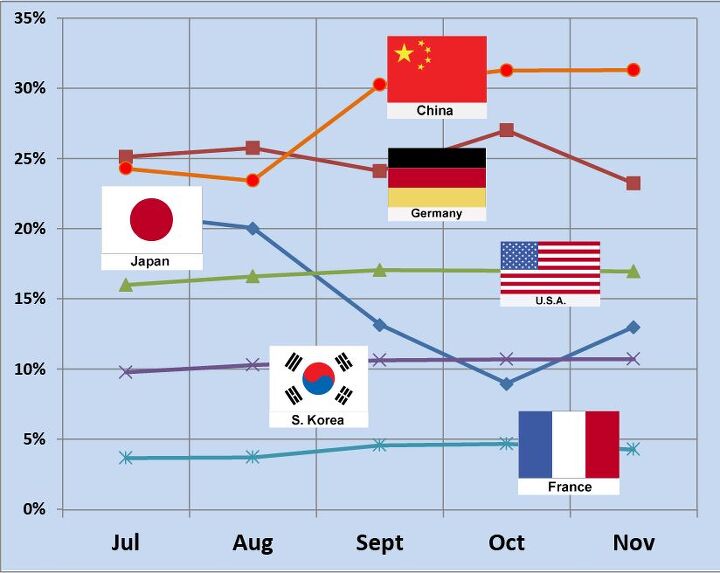#islands
Island Issue Still Keeping Japan's China Sales In Check
Japanese carmakers are not out of the woods yet in China, and might be in the thick of things again if matters flare up. The other day, 30 right wing Japanese activists had to be kept away by Japanese Coast Guard, while the US and Japan held war games in preparations for a possible Chinese invasion of the Senkaku/Diaoyu Islands.
Did Anyone Mention Islands? Chinese Buy Japanese Again
Found around the corner from Toyota
It’s not quite the all clear, but Japanese automakers (and their government-owned Chinese joint-venture partners) breathe a bit easier after receiving April sales numbers for China. Numbers had been down severely after last September’s anti-Japan riots. Latest “figures suggest that the firms are closer to recovering their lost sales,” says The Nikkei [sub].
Island Row Can Turn Ugly Again
As predicted by TTAC after Chinese demonstrations against Japan’s control of the Senkaku/Diaoyu islands turned into violence against Japanese cars and car dealerships in China, the matter turned into a severe sales setback for Japanese car companies in China, more severe than initially thought, or hoped . Also as predicted by TTAC, the islands did affect the sales of Japan’s carmakers more than the tsunami. Last Saturday in Shanghai, Toyota’s China chief confirmed that the pain would be felt at least through August. This was before he heard the really bad news.
Japanese Auto Sales In China Way Down Crawling Back To Normal
As expected, sales of Japanese cars in China took a nosedive to levels not seen since the days after Japanese cars and dealerships were torched last September. Sales of Nissan and Toyota are down a whopping 46 percent. No, it’s not a new flare-up of anti-Japanese riots. This time, it’s the effect of the Chinese Lunar calendar.
Toyota's China Sales Way Up! Is Peace Breaking Out?
Toyota, along with its Japanese peers, has wallowed in double digit minus territory in China, ever since cars were upturned and dealerships torched in September over a few uninhabited rocks in the East China Sea. In January, China sales of Toyota shot up 23.5 percent compared to the same month a year earlier. Are Japanese fortunes in China finally turning to the better?
Japanese Carmakers, Profits Suffer From Island Row In China
Honda made cautionary noises when announcing its quarterly numbers today, taking its annual profit forecast for the year down a notch to 370 billion yen ($4.1 billion). Three months ago, Honda already had cut its profit forecast for the fiscal year to March to 375 billion yen ($4.7 billion) from its earlier estimate of 470 billion yen ($5.9 billion). $1.8 billion evaporated on the forecast, mostly due to continuing sales troubles in China.
Japanese Cars Continue To Suffer In China
Sales of Japanese car in the world’s largest car market, China, continue to be impacted by the war of words (and occasionally sledge hammers) over uninhabited rocks in the East China sea. Sales are inching up a bit after customers dare to come back to the showrooms of Japanese brands.
Chinese Brands Continue To Profit From Japanese Woes, Germans Not So Much
Market share by country, passenger vehicles, w/o SUV
The island row does not make headlines anymore in China where people focus on the once in a decade transition of power. Japanese carmakers however still feel the pain. Two countries appear to be the winners: China and Germany.
Tokyo Paper: Toyota To Delay New Factories in China
Toyota decided to postpone construction of a new plant in Tianjin, China, and is considering the delay of another new plant in Guangzhou, Japan’s Asahi Shimbun writes, quoting unidentified sources. This due to sluggish vehicle sales in the wake of anti-Japan protests over the Senkaku/Diaoyu islands dispute, Asahi Shimbun’s sources said.
China Row Could Be Worse Than Tsunami, Effects Could Last More Than A Year
In September, formerly red-hot sales of Japanese cars in China began to crater after cars were turned over and dealerships torched as fallout of a diplomatic row between Japan and China. Sales were down by about a half in October, and a little less than a third in November. At TTAC, we were skeptical that sales will be back to their old glory in a few months. A high ranking Toyota executive said for the first time that it will take long to recover.
What Is Happening To Toyota, Honda, Nissan In China, The Same Can Happen To GM
Buried In the depths of General Motor’s quarterly results is a routine litany of negative factors that could severely hamper the company’s future. One of them is “Significant changes in economic, political and market conditions in China.” GM intently monitors what is happening to Japanese brands in China, and it has more reason to watch with worries than with glee. What is happening to Toyota, Honda, and Nissan right now could just as easily happen to GM. The Japanese might shake off the troubles – Japanese makers have seen worse in the very recent past. GM would be brought to its knees by a boycott of American cars in China. Quite possibly, one of the reasons behind the whole anti-Japanese exercise is to say “look what could happen to you.” Government Motors finds itself at the mercy of China.
Chinese Continue To Shun Japanese Cars
Chinese sales of Japanese makes continue to suffer from the fallout of the islands row. Toyota told Reuters that Chinese sales were down 22.1 percent YoY in November. Mazda’s China sales were down 29.7 percent compared to November last year, Reuters says. The severity of the drops has lessened, but it will be a while until Japanese brands return to their regular growth pattern in China.
Japanese Car Sales In China Expected To Be Down In November, But Less Than In October
The boycott of Japan-branded cars by Chinese customers appears to be abating faster than feared by some, but not as fast as hoped by others. Nissan expects its November sales in China to be down by approximately 25 percent, Hideki Kimata, senior general manager of Nissan’s joint venture with Dongfeng, told Reuters. Yesterday, Mazda’s China chief said he expects sales in China to be down by around 35 percent in November.
Official Statistics: Chinese Brands Big Winner Of Anti-Japanese Row
We have followed the effects of the Chinese boycott of Japanese products with great interest, especially when it came to cars. Encouraged by very strong sales of German brands, we declared them the winner of the war of words. It looks like we may have made a mistake. At least if we can trust official Chinese statistics.
Nissan Prepares For The Worst In China
All three major Japanese automakers have reported their half year financial results. After Honda last week and Toyota yesterday, Japan’s number two automaker Nissan followed today. The presentations could not have been more different.



























Recent Comments